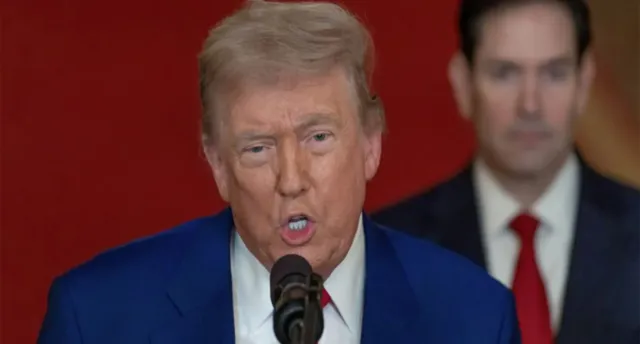
Trump Calls for Tougher NATO Sanctions, Criticizes Europe’s Russia Oil Buys
Former U.S. President Donald Trump has called for NATO to impose much stricter sanctions against Russia, while also criticizing European countries for their continued purchases of Russian oil. Trump’s remarks come amid ongoing concerns about the effectiveness of existing sanctions and the need to further pressure Russia over its actions in Ukraine.
Speaking at a recent rally, Trump asserted that NATO needs to take a stronger stance against Russia, arguing that current measures are insufficient to deter Moscow’s aggression. He specifically targeted European nations, accusing them of undermining the impact of sanctions by continuing to buy Russian oil and gas. “They’re still buying Russian oil,” Trump stated, adding that this provides Russia with crucial revenue that fuels its war efforts.
Trump’s criticism echoes concerns raised by some within the international community, who believe that loopholes and exemptions in the current sanctions regime are allowing Russia to circumvent the restrictions. Some experts suggest that a complete embargo on Russian energy exports would be the most effective way to cripple the Russian economy and force Moscow to reconsider its policies.
However, European countries have faced significant challenges in reducing their dependence on Russian energy. Many nations rely heavily on Russian oil and gas for their energy needs, and a sudden cutoff could have severe economic consequences. Efforts are underway to diversify energy sources and transition to renewable energy, but these transitions take time and require substantial investment.
The former president has long been a vocal critic of NATO allies, accusing them of not contributing enough to the alliance’s defense spending. He has repeatedly called on European nations to increase their financial commitments to NATO and to take a more assertive role in addressing security challenges.
The ongoing conflict in Ukraine has intensified the debate over the effectiveness of sanctions and the need for a unified international response to Russian aggression. While sanctions have undoubtedly had an impact on the Russian economy, they have not yet achieved the desired outcome of compelling Moscow to withdraw its forces from Ukraine.
The United States, along with other Western allies, has imposed a series of sanctions on Russia, targeting individuals, entities, and key sectors of the Russian economy. These sanctions aim to restrict Russia’s access to international finance, limit its ability to import technology, and disrupt its energy production.
The effectiveness of sanctions is a complex and multifaceted issue. While sanctions can inflict economic pain on the targeted country, they can also have unintended consequences, such as harming innocent civilians and disrupting global supply chains. It is important to carefully calibrate sanctions to maximize their impact on the targeted regime while minimizing the collateral damage.
The debate over sanctions is likely to continue as the conflict in Ukraine drags on. The international community faces the challenge of finding the right balance between applying pressure on Russia and avoiding actions that could further destabilize the global economy. Strengthening NATO’s resolve and ensuring a unified approach among allies will be crucial in addressing the challenges posed by Russia.
Disclaimer: This news article is based on publicly available information and may be subject to updates.




